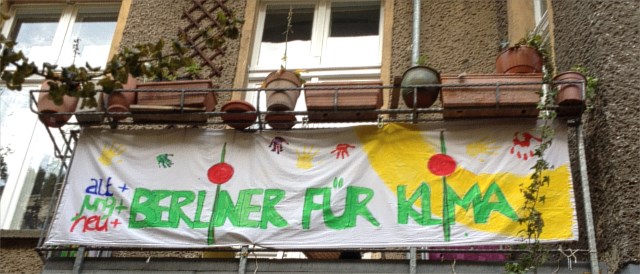Berliners go to the polls this Sunday (Nov. 3). But it’s not to elect a new parliament or chancellor – or even a municipal administration. Rather there’s a city-wide referendum about energy, namely of putting the transmission grid into citizens’ hands and founding a clean energy-minded municipal utility in Berlin.

Photo by Paul Hockenos, CC BY
Quite honestly, this isn’t a very unique or radical idea in Germany. There are over 800 municipal utilities across the country, which are an excellent fit for transitioning to a decentralized, patchwork national energy supply. Many of them concentrate on renewables and some have even made it their town’s goal to go 100-percent renewable by 2030 or 2035. Some are already well on their way, far ahead of the federal government’s plans for the nation as a whole.
I’m not exactly impartial about the whole thing as you can see from the photo: That’s my balcony in Prenzlauer Berg, Berlin’s boho-chic quarter that votes greener than any other voting district in the entire republic. So we’re preaching to the converted, but our three-year-old loved helping paint the banner, and it looks great from the street below. Moreover, the trick is to inspire people to get up and go vote as it requires over 600,000 votes to force the city to take over the lease from the Swedish nuclear and fossil fuel giant Vattenfall. Over 200,000 people signed the petition to put the issue on the ballot in the first place. Berlin has 3.5 million people. But how many will relinquish part of their Sunday to vote?
There are arguments for and against it. Those in favor say that taking the grid away from Vattenfall will make it cheaper and more responsive to Berliners’ needs and wishes – like turning Berlin’s power supply green. As it stands, power in Berlin comes mostly from coal; only 1.4% of its energy is generated by renewable sources, far below the national average. Moreover, the revenue will stay in Berlin rather than flowing out of the city into Vattenfall’s bank accounts. The Stadtwerke idea, they say, is also more democratic, transparent, and will cost users less.
Critics, like those from Vattenfall’s corner, say only a massive utility like Vattenfall can ensure reliable, stable energy supply. This is obviously not the case as municipally owned grids elsewhere in Germany do a perfectly capable job. But yet others say there’s no need for clean-energy supporters to own the grid in the first place – it’s neutral these days, unlike in the past – and transports whatever kind of energy the consumers or the city orders.
The campaign’s organizers say that the expiration of Vattenfall’s 20-year lease on the transmission grid is the occasion for the referendum, but the real goal is a municipal utility, to get Germany’s capital on the same path as smaller cities and towns across the country. And even if the campaigners don’t get 600,000 votes, the fight for a Stadtwerke and greener Berlin has only just begun, say the organizers.
By Paul Hockenos, journalist and author, “Going Renewable” blog. This article first appeared on the German Council on Foreign Relations’ website.